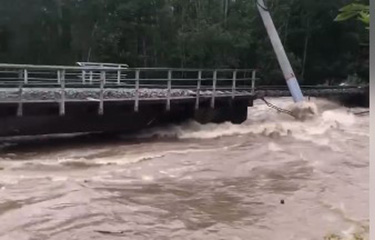Russian dam collapse cuts off cargo rail link to Far East

The collapse of a dam in Russia has washed away the tracks of the Baikal-Amur railway, one of the transport links that carries cargo from Russia’s Far East to its more populated western regions.
On the night of 19 August, a dam burst in the Severo-Baikalsky district of Buryatia, Russia, and washed away the rail tracks of the Baikal-Amur Mainline, according to Latvia-based news outlet Meduza, which reported 200 meters of railway track were washed away and 10 poles of the contact network were damaged.
“The damage to the country's economy from idle cargo will amount to billions of rubles. Plus the cost of restoring the railway,” Republic of Buryatia Head Alexei Tsydenov said on his Telegram channel.
According to the East Siberian Transport Prosecuter’s Telegram channel, traffic on the railway is temporarily closed and the movement of trains will be delayed until a new link can be established. A state of emergency was established in the region due to heavy rainfall and widespread flooding, and employees of the Severobaikalsky District of the Ministry of Internal Affairs of Russia on transport traveled to the area to assess and address the damage.
The East Siberian Transport Prosecutor’s Office said it is continuing to supervise the railway's restoration, and TASS reported Russian Railways has started to lay new track. The prosecutor’s office did not give a timeline on when the rail link might be reestablished.
"We are already laying a new track near the damaged line on the BAM washout area at the Nizhneangarsk-Kholodnaya haul,” Russia Railways said in a statement. “We started drying soil and forming an embankment without waiting until water completely recedes.”
The Baikal-Amur Main Line is nearly 2,700 miles long, running just north of Lake Baikal and ending at the port city of Sovetskaya Gavan.
Railway links to the Far East are an important part of Russia’s transport infrastructure, and have been a heavy focus for the Russian government in recent years. A large portion of Russia’s salmon and pollock catch in the Pacific is transported by rail from the sparsely populated Far East to the country’s more populated west.
In recent years, Russia has worked to improve infrastructure in the Far East through investments in ports and using new technology to improve cold chain logistics on its railways.
However, Problems with Russia’s rail infrastructure had resulted in supply chain issues for the country's seafood industry. Recently, the government considered rail subsidies to reduce costs and lower retail prices of species sold domestically, including pollock and pink salmon. The rail disruptions could cause logistical issues for transportation of the country's huge pink salmon catch thus far this season.
Photo courtesy of the East Siberian Transport Prosecutor’s Office






Share